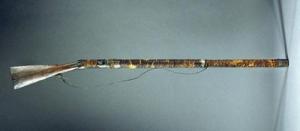War & peaceHow Western Europe came to dominate the globe
Although Europe represents only about 8 percent of the planet’s landmass, from 1492 to 1914, Europeans conquered or colonized more than 80 percent of the entire world. There are many possible explanations for why history played out this way, but few can explain why the West was so powerful for so long. Caltech’s Philip Hoffman, a professor of business economics and history, has a new explanation: the advancement of gunpowder technology. The Chinese invented gunpowder, but Hoffman argues that certain political and economic circumstances allowed the Europeans to advance gunpowder technology at an unprecedented rate — allowing a relatively small number of people quickly to take over much of the rest of the globe. What lessons does his explanation of the West’s rise to dominance offer for today’s policy makers? “In a world where there are hostile powers, we really don’t want to get rid of spending on improving military technology,” Hoffman says. “I would much rather see expenditures devoted to infrastructure, or scientific research, or free preschool for everybody – things that would carry big economic benefits,” and “I wish we did live in that world, but unfortunately it’s not realistic.”

Early handcannon was the key to European dominance // Source: si.edu
Although Europe represents only about 8 percent of the planet’s landmass, from 1492 to 1914, Europeans conquered or colonized more than 80 percent of the entire world. Being dominated for centuries has led to lingering inequality and long-lasting effects in many formerly colonized countries, including poverty and slow economic growth. There are many possible explanations for why history played out this way, but few can explain why the West was so powerful for so long.
Caltech’s Philip Hoffman, the Rea A. and Lela G. Axline Professor of Business Economics and professor of history, has a new explanation: the advancement of gunpowder technology. The Chinese invented gunpowder, but Hoffman, whose work applies economic theory to historical contexts, argues that certain political and economic circumstances allowed the Europeans to advance gunpowder technology at an unprecedented rate — allowing a relatively small number of people quickly to take over much of the rest of the globe.
Hoffman’s work is published in a new book titled Why Did Europe Conquer the World? (Princeton University Press, 2015). Jessica Stoller-Conrad of CalTech spoke with him recently about his research interests and what led him to study this particular topic.
Jessica Stoller-Conrad: You have been on the Caltech faculty for more than 30 years. Are there any overarching themes to your work?
Philip Hoffman: Over the years I’ve been interested in a number of different things, and this new work puts together a lot of bits of my research. I’ve looked at changes in technology that influence agriculture, and I’ve studied the development of financial markets, and in between those two, I was also studying why financial crises occur. I’ve also been interested in the development of tax systems. For example, how did states get the ability to impose heavy taxes? What were the politics and the political context of the economy that resulted in this ability to tax?
JS-C: What led you to investigate the global conquests of Western Europe?
PH: It’s just fascinating. In 1914, really only China, Japan, and the Ottoman Empire had escaped becoming European colonies. A thousand years ago, no one would have ever expected that result, for at that point Western Europe was hopelessly backward. It was politically weak, it was poor, and the major long-distance commerce was a slave trade led by Vikings. The political dominance of Western Europe was an unexpected outcome and had really big consequences, so I thought: let’s explain it.
